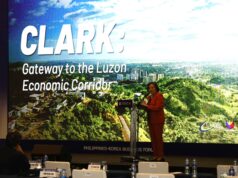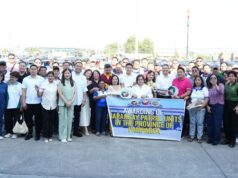Gov. Lilia G. Pineda sounded the call at last month’s joint Provincial Peace and Order Council and Provincial Anti-Drug Abuse Council meeting.
“’Yung filing (of certifi cate of candidacy), malapit na lang. Kausapin ninyo sino ’yung former drug addict, pusher, pati ’yung nagpoprotekta na huwag nang pahabulin. Dapat hindi na sila pwedeng mag-file. Kayo ang chief executive ng bayan. Mahirap na kung kahit SK maging involved sa drugs,” Pineda told the mayors.
Some people readily dismissed the governor’s pronouncements as her way of channeling President Duterte: To impress upon Malacanang that she has not been remiss in her duties in the war against drugs.
Indeed, the governor has never been remiss in that duty, as she has never been the least remiss in her other duties as governor.
Truth to tell, she has been in the thick of the anti-drug campaign since her assumption of office – two full terms even before Duterte considered running for president.
Here’s a piece that appeared here in September 2014.
DANGEROUS ARE these times we live in.
Death strikes anywhere, anytime, anyone. Rapine respects no bounds, not even fraternal or familial ones. Mayhem breaks loose at a sniff , aye at the whiff , of some mind-blowing crystalline grains.
Aye, some strong smoky substance there powerful enough to permeate the rich man’s gated castle as effortlessly as the poor man’s hovel.
So, how pervasive is the drug problem in Pampanga? Let’s do some dope economics.
Statistics from the Philippine Drug Enforcement Agency excludes not one of the province’s 505 barangays from drug influence. That’s the market, a really big one, any way you look at it.
Shudder more at the scope and scale of the supply side.
It has not been a month yet when some 279 kilos of methamphetamine hydrochloride, better known as shabu, and 975 kilos of ephedrine and other substances used in shabu manufacture worth some P4-billion – later reports put it at P6.5 billion – were confiscated in successive raids by the Philippine Drug Enforcement Agency and police operatives at the Greenville Village and Richtown Subd. in the City of San Fernando.
Much earlier was that haul of over P150- million (only?) worth of shabu at uppity Lakeshore subdivision in Mexico town, where the apparently much undervalued booty and questionable “escape” of a Chinese suspect resulted to some sanctions against the raiding team, including summary dismissal proceedings.
That drug fiends can easily set shop in upscale enclaves and go about their evil enterprise with impunity is an indictment as much of the inability of the police as the disability of the local government units to contain this heinous scourge to society.
Not that nothing is being done about it by the LGUs.
Gov. Lilia G. Pineda, from Day One of her first term has integrated an anti-drug campaign in Priority One of her agenda for development – the total well-being of the Kapampangan.
Towards that purpose and cognizant of the critical role the maintenance of peace and order plays in community development – and well aware of the needs of the police forces to fulfill their mandate to serve and protect the populace – Pineda has showered the local force with provisions addressing their material as well as morale requirements, read: radios and other equipment, infrastructures such as precincts and outposts, motorized vehicles, PhilHealth coverage, scholarship grants and livelihood assistance for their dependents.
Pineda has likewise engaged the barangay tanods as multiplier force in law enforcement with equal support in morale and materiel. Periodic pep talks – and reprimand when needed, delivered in her motherly manner – have become one long-running affair between the Pineda administration and the barangay officials.
In district-wide barangay anti-drug summits, Pineda involved the PDEA, the police and the courts, to orient barangay officials on drug laws and provide them inputs on basic intelligence gathering.
The rehabilitation component of the antidrug campaign is not lost to the Pineda administration, having provided assistance to drug users and their families to cope with the rehab programs they needed to undertake.
Pineda has even initiated a study on the feasibility of the province to put up and administer its own ward for poor drug users at the Central Luzon Rehabilitation Center in Magalang town, which already gets some P1.4 million monthly subsidy from the provincial government.
Pineda’s magisterial, if maternal, enjoinder to the LGUs and the police have become some sort of a mantra: “I want this to stop. Let us not permit illegal drugs to destroy our children’s future…Catch the pushers, save the users…Do you wish to see your children dead on the road?”
Still, desperate are the times. And desperate times demand draconian, if not dangerous, measures.
Cadavers have started to litter the Pampanga landscape.
Just this week, two male bodies believed to be victims of summary execution, better known as “salvaging” – were found at a garbage dump in Barangay San Isidro, Bacolor town.
In Candaba town, two – one a 15-year-old boy – were gunned down by “motorcycle-riding criminals” in separate incidents.
Earlier, there were reports of dead men casually dumped by the roadsides or in some grassy areas “not far” from some lonely road in the towns of Apalit, Magalang and Mexico, and in Mabalacat City.
Clear cases of termination with extreme prejudice there. Of desperate measures noncommensurate even to the most desperate of times. The nullity of human life, the negation of due process, never a means justifiable in any case. Not in Davao, notwithstanding Duterte’s way of maintaining the peace. Certainly not in Pampanga, given the caring Nanay for governor.
Never short of peaceful options even in the face of the most extreme situations, Pineda has asked the sangguniang panlalawigan to empower the barangay officials in the registration of transients renting houses in their respective barangays, especially those in private subdivisions, as well as monitor their activities.
“We expect the barangay chairman and his council to revive the old spirit of bayanihan and the value of malasakit through vigilance in the conduct of neighborhood watch and efficient reporting system,” said Pineda. “This will surely deter evil elements from penetrating our communities.”
Vigilance. Not vigilantism. Nanay is crystal clear there.



